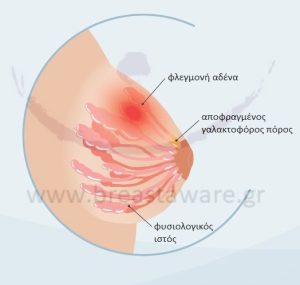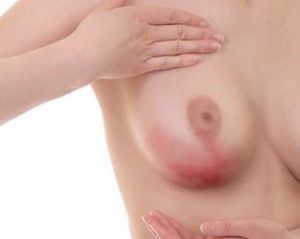Mastitis: Everything You Need to Know
The mastitis is an inflammation of the breast that occurs most often during breastfeeding, but can also occur due to a microbial infection. Symptoms such as redness, pain, swelling, nipple discharge, palpable lump and increased breast temperature are characteristic. In more severe cases, mastitis can cause fever, chills and, if not treated promptly, can lead to abscess, which usually requires surgical drainage.

Causes of Mastitis
The most common cause of mastitis is breastfeeding, affecting 2-10% of women, mainly in the first 6-8 weeks or during weaning. Incomplete removal of milk can lead to blockage of the lactiferous ducts, causing inflammation.
Other causes include:
- Nipple microtrauma allowing bacterial entry
- Milk stasis within the breast
- Rarely, cases of mastitis not related to breastfeeding, such as peri-papillary mastitis, idiopathic granulomatous mastitis or tuberculous mastitis. Notably, according to a 2025 study, idiopathic granulomatous mastitis (IGM) appears to be more related to secretions and an inflammatory reaction to milk within the breast tissue, rather than to an autoimmune or infectious etiology.
Risk Factors for Mastitis
Certain factors increase mastitis risk:
- Previous episodes of mastitis
- Poor breastfeeding or milk expression technique
- Tight clothing or bras restricting milk flow
- Smoking, poor nutrition, excessive fatigue, and stress
Prevention of Lactational Mastitis
To prevent mastitis:
- Breastfeed frequently and from both breasts
- Avoid breast engorgement
- Ensure proper latch of the baby on the breast
- Fully empty the breast after each feeding
- Although not yet official recommendations, probiotics have been investigated recently as an alternative or adjunct to prevent and manage mastitis by modulating breast microbiota balance
Consulting a lactation specialist can be very helpful for a healthy and successful breastfeeding experience

Diagnosis of Mastitis
Diagnosis is usually based on the clinical picture. In case of suspicion of a selected infection or failure of initial treatment, it is recommended milk culture for accurate selection of antibiotic therapy. It is important to rule out the possibility of inflammatory breast cancer, that shows similar symptoms, through imaging tests or biopsy.
Treatment of Mastitis
Treatment includes:
- Grant antibiotics for about 10 days
- Use analgesics and anti-inflammatory medicines
- Continued breastfeeding or milk expression to relieve breast engorgement
- Applying warm compresses before and cold after breastfeeding for relief
Prompt management leads to full recovery and prevents serious complications.
Στο BreastAware.gr , you will find reliable information and practical advice for breast health. We support you with up-to-date
Scientifically validated guidance tailored to your needs!
- Spencer JP. Management of mastitis in breastfeeding women. Am Fam Physician. 2008 Sep 15;78(6):727-731.
- Amir LH, Trupin S. Diagnosis and treatment of mastitis in breastfeeding women. J Hum Lact. 2014 Feb;30(1):10–13.
- Amir LH, et al. Risk factors for mastitis in breastfeeding women. J Hum Lact. 2001 May;17(2):132–139.
- Berens PD. Breast Pain: Engorgement, Nipple Pain, and Mastitis. Clin Obstet Gynecol. 2015 Dec;58(4):902–914.
- Castro D, et al. Idiopathic granulomatous mastitis and breastfeeding: what is the relationship? A retrospective study. J Obstet Gynaecol Res. 2025 Apr;51(4):234-240.
- Fernández L, et al. The use of probiotics for the treatment and prevention of mastitis in breastfeeding women: A systematic review. Nutrients. 2020 Mar;12(3):678.
- Berens PD, et al. Acute mastitis: Clinical presentation and treatment. Clin Obstet Gynecol. 2025 Mar;68(1):85–92.
